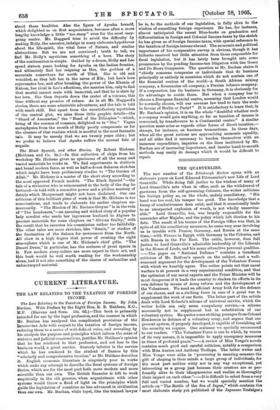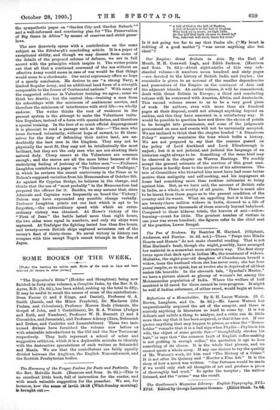The new number of the Edinburgh Review opens with an
elaborate paper on Lord Edmond Fitzmaurice's new Life of Lord Granville. While doing full justice to the wisdom of many of Lord Granville's acts when in office, such as the withdrawal of garrisons from the self-governing Colonies, the writer criticises his foreign policy as, on the whole, unduly conciliatory. " His hand was too cool, his temper too good. The knowledge that a bump of combativeness does exist, and that it occasionally leads to an unexpected explosion of wrath, is not wholly unservice- able." Lord Granville, too, was largely responsible for the surrender after Majuba, and the policy which left Gordon to his fate. The result of his tenure of the Foreign Office was that, in spite of all his conciliatory measures, he came very near involving us in trouble with France, Germany, and Russia at the same time,—with France in Egypt, with Germany in the Colonies, and with Russia in the Far East. The critic, however, does full justice to Lord Granville's admirable leadership of the Liberals in the House of Lords, and his many attractive personal qualities. —The paper on " National Defence " contains a trenchant criticism of Mr. Balfour's speech on the subject, and a well- reasoned argument for the development of the Volunteer Forces with which we heartily agree. The writer points out that naval warfare is at present in a very experimental condition, and that the optimism of our naval experts and the Prime Minister will be most dangerous if it leads the country to slacken its efforts in its own defence by means of Army reform and the development of the Volunteers. We need an efficient Army both for the defence of our shores, and as a striking force in case of a great war to supplement the work of our fleets. The latter part of the article deals with Lord Roberts's scheme of universal service, which the writer holds can only mean compulsory service,—a scheme necessarily not in supplement but in substitution of our voluntary system. He quotes some striking passages from Colonel Henderson in defence of a voluntary army, and argues that our present system, if properly developed, is capable of furnishing all the security we require. One sentence we specially recommend to our readers. "The Volunteer Force is one to which, by reason of its very nature, it is impossible to apply emergency measures in times of profound peace."—A review of Miss Yonge's novels contains much good and careful criticism, notably a comparison with Miss Austen and Anthony Trollope. The latter writer and Miss Yong° were alike in "possessing in amazing measure the gift of shaping in their minds a large group of individuals, for the most part neither witty nor in any way exceptional, yet interesting as a group just because their creators are so pro- foundly alive to their idiosyncrasies and realise so thoroughly their impact on each other."—It is difficult to select from a very full and varied number, but we would specially mention the article on " The Battle of the Sea of Japan," which contains the most elaborate study yet published of the Japanese Trafalgar;
the sympathetic paper on "Garden City and Garden Suburb " and a well-informed and convincing plea for " The Preservation of Big Game in Africa" by means of reserves and strict game- laws.
The new Quarterly opens with a contribution on the same subject as the Edinburgh's concluding article. It is a paper of
exceptional ability, and though we may dissent from some of the details of the proposed scheme of defence, we are in full accord with the principles which inspire it. The writer points
out that all that a continued command of the sea without an effective Army would mean in case of war would be that things would come to a checkmate. Our naval supremacy offers no hope of a speedy conclusion. He desires to see "a strong Navy, a limited Regular Army, and an additional land force of a strength comparable to the forces of Continental nations." With many of the suggested reforms in Volunteer training we agree ; some we think too drastic ; but the central idea—training a man from his schooldays with the minimum of continuous service, and therefore the minimum of interference with civil life—we wholly endorse. The writer thinks the root of weakness in the present system is the attempt to make the Volunteers imita- tion Regulars, instead of a force with special duties, and therefore a special training. In the face of so much official disparagement it is pleasant to read a passage such as this :—" The men who come forward voluntarily, without hope of reward, to fit them- selves for the duty of defending their native land, are un- doubtedly the best men in the kingdom. They may not be physically the most fit, they may not be intellectually the most brilliant, but they are the only men who are not shirking their natural duty. Cheap sneers at the Volunteers are common enough ; and the sneers are all the more bitter because of the underlying feeling of jealousy of the better men."—Professor Laughton contributes a paper on "The Centenary of Trafalgar," in which he reviews the recent controversy in the Times as to Nelson's supposed variation from his Memorandum of October 9th. As against Sir Cyprian Bridge, he believes in the change, and thinks that the use of "most probably" in the Memorandum had prepared the officers for it. Besides, we may assume that, since Admirals and Captains were frequently on board the ' Victory,' Nelson may have expounded any possible change verbally. Professor Laughton points out one fact which is apt to be forgotten,—the extraordinary speed with which an extra- ordinary victory was obtained. At Howe's victory of the " First of June " the battle lasted more than eight hours, the two sides were equal in numbers, and only six ships were captured. At Trafalgar the fighting lasted less than five hours, and twenty-seven British ships captured seventeen out of the enemy's fleet of thirty-three. No naval victory in history can compare with this except Togo's recent triumph in the Sea of Japan.



















































 Previous page
Previous page